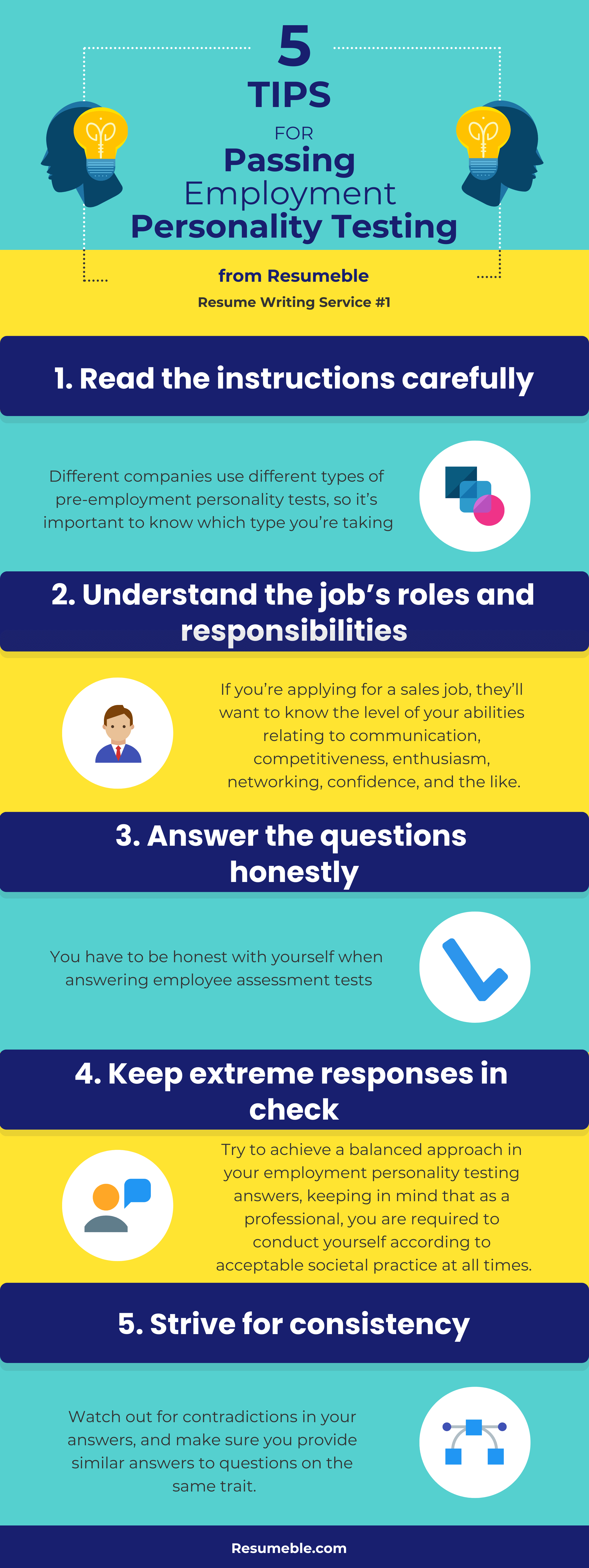Basically, a pre-employment personality test is a series of questions that seek to provide better insight into an individual’s personality and behavior. With employee personality testing, employers can have a good idea of whether an applicant will be a good fit for the position that he or she is applying for.
Master the Art of Personality Testing for Employment
Suffice it to say, if you want to get hired, you need to not only pass the pre-employment personality test but also ace it with flying colors. Here’s exactly what you need to do:

1. Read the Instructions Carefully
Different companies use different types of pre-employment personality tests, so it’s important to know which type you’re taking. Among the more popular pre-employment personality tests in use today are the Myers-Briggs Type Indicator, Caliper Profile, DISC (Dominance, Influence, Steadfastness, and Conscientiousness) Assessment, and PI (Predictive Index Behavioral Assessment. These can vary in structure and style, so take the time to read the available information.
Depending on the test, you may be required to provide more than one answer or select the best answer via multiple choice or a number scale. If the test is timed, be aware of how many questions you need to answer and how many minutes it should take to answer each.
2. Understand the Job’s Roles and Responsibilities
Always keep the purpose of the employee personality testing in mind, which is to find out if you are a good fit for the role and that you have the potential to excel at your new job. So if you’re applying for a sales job, they’ll want to know the level of your abilities relating to communication, competitiveness, enthusiasm, networking, confidence, and the like. If your answers make you come off as someone who’s timid or lacks initiative, you’ll likely be passed up for the role. Focus on making sure that you’re seen as someone who’s a good conversationalist with an outgoing and engaging personality, which will signify to evaluators of personality testing for employees that you’re an ideal candidate for the position.
3. Answer the Questions Honestly
Of course, it goes without saying that you have to be honest with yourself when answering employee assessment tests. Let’s say that the job you’re applying for requires good leadership skills, but this is one skill area that you know needs some development. Don’t lie about it on your employee personality testing. Lying on your test so you can come off as highly qualified doesn’t benefit anyone — not the company, and certainly not you. Believe it or not, savvy recruiters know when an applicant is being untruthful because this often leads to a confused personality profile. If you’re unsure of a question in the HR personality test, leave it blank and go back to it once you’re finished with the rest of the test.
4. Keep Extreme Responses in Check
Some employee personality testing questions evaluate criteria on a numbered scale, providing applicants with a choice from least to greatest. For instance, one question may ask if you “strongly disagree” or strongly agree” on a topic. It’s perfectly fine to choose a few extreme responses here and there, but be careful not to pick too many, or, for that matter, too few. Too many may make you come off as too idealistic, while too few could give the impression that you lack the drive to succeed. Try to achieve a balanced approach in your employment personality testing answers, keeping in mind that as a professional, you are required to conduct yourself according to acceptable societal practice at all times.
5. Strive for Consistency
Watch out for contradictions in your answers, and make sure you provide similar answers to questions on the same trait. For example, if you answer in the affirmative to the question, “I have good people skills,” then you should also respond positively to “I am a good communicator.” Pay attention to similar questions with slightly different or opposite wording. Otherwise, if you contradict yourself too often, the evaluating recruiter or hiring manager may start to view you as untrustworthy, or worse, someone who doesn’t understand basic employment personality testing questions.
FAQs about Pre-Employment Personality Tests
Q: How much do pre-employment personality tests count?
A: While pre-employment personality tests are important, they are not the be-all and end-all of employment. The best companies consider many other aspects of an applicant’s personality and skills, so even if you don’t think you aced the test, don’t lose hope. You might still make up for it with your qualifications or how well you handle the job interview.
Q: Are pre-employment personality tests legal?
A: Pre-employment personality tests are considered legal as long as they are not used to discriminate against a person’s race, religion, disability, age, gender, etc. Likewise, the tests must directly relate to the job at hand. If you feel there’s a question that doesn’t directly apply to the skills and abilities needed to perform the job, you may bring this up with the recruiter for clarification.
Q: Do pre-employment personality tests work?
A: While they are undoubtedly useful, pre-employment personality tests are not necessarily effective at predicting if a candidate will thrive at the job. That’s why, as mentioned, they are not the be-all and end-all of employment, and companies and organizations rarely use them as a sole or primary reason for hiring. Other hiring methods used by companies and organizations include job interviews, references, and the quality of the resume.
Does your resume need some work?
If you feel that your resume is in need of some updating, Resumeble is here to help you make your resume the best it can be. Choose from three resume writing service packages and craft a powerful and impactful resume today.
